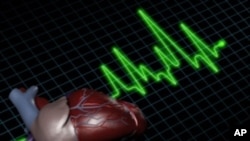In 1963, the U.S. Congress designated February as the American Heart Month to raise awareness about heart disease in the United States. However, little attention has been devoted to female heart disease, even though it is reported to be the number one killer of women in the United States. And more American women now die of heart disease than men.
In a video message to a women’s heart disease symposium in New York City, U.S. Secretary of Health and Human Services, Kathleen Sebelius said nearly 43 million American women, one-third of the total, live with or risk having heart disease. She added that heart disease claims the lives of more women in the U.S. than the next four leading causes combined.
"Researchers and scientists know these figures. But it’s important that women know them too, because even though women are more likely to die from heart disease than men, they are less likely to receive the recommended care to prevent it," she said.
Panel members noted that more women have died of heart disease in America since 1984 than men. But experts say a majority of women do not display the classic symptoms of a heart attack typically associated with men.
Dr. Noel Berz of the Cedars-Sinai Medical Center in Los Angeles characterized male symptoms as the "Hollywood heart attack".
"Shortness of breath, in the middle of the chest - boom, you fall over. You’ve seen it in the movies. That’s true less than half of the time for women. Again, atypical symptoms are as equally prevalent. So it could be just indigestion, or it could just be extreme fatigue; it could just be some jaw or some arm pain," he said.
Merz notes that one-third of male heart attack victims have such atypical symptoms.
Dr. Chet Rihal, the Chair of Cardiovascular diseases at the Mayo Clinic, says medical schools have taught the classic male presentation of a heart attack for generations. As a result, many cardiologists still do not recognize subtle female symptoms. In addition, Rihal says, research on sex-based differences is relatively new.
"We now understand more and more about them. But getting that information out to the practicing cardiologists, internists or family practitioners, has been a slow process of diffusion," he said.
Ileana Pina, Professor of Medicine at the Case Western Reserve University in Cleveland, Ohio, said women themselves have a responsibility to learn more about risk factors and to ask their doctors the right questions.
"If you cholesterol hasn’t been done, ask for it. Get your sugar, your glucose [numbers], find out what your waist circumference is - all the factors that will get you in trouble," she said.
The heart experts noted that women frequently neglect their own health to take care of their families. Elizabeth Ofili, Chief of Cardiology at the Morehouse School of Medicine in Atlanta, says young women with a history of family heart disease often dismiss warning signs.
"Women tend to think, yes, maybe there’s someone in my family has suffered these problems; there’s high blood pressure, maybe they’ve even had a stroke, congestive heart failure and kidney problems, but I have some time, and whatever is going on now, I will be able to overcome it later," she said.
Ofili says women should pay particular attention to abnormalities during pregnancy, such as high blood pressure or diabetes, even if they go away after childbirth, because they could be indicators of future problems.
The panelists gave standard recommendations that apply to equally to men and women everywhere - do not smoke, limit alcohol consumption, exercise and eat a healthy diet. The risk of ignoring the advice is not simply a sudden and early death, but also reduced quality of life if the heart slowly loses its ability to pump. And as one doctor noted, it’s not enough for a doctor to recommend; the patient must believe the recommendation to be true and must act on it.
Heart Disease is Top Killer of US Women




